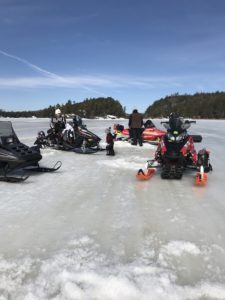 Are you interested in cold-weather camping? Wouldn’t it be great if you could park your RV near a ski hill or another great place for winter RV camping?
Are you interested in cold-weather camping? Wouldn’t it be great if you could park your RV near a ski hill or another great place for winter RV camping?
Our goal is to help you utilize your RV throughout the winter, including maintaining and protecting it from Mother Nature, winterizing and storing it, and even renting your RV out to others in warmer regions.
Camping in cold weather is defined as?
A person camping in their RV in cold weather when the temperature is constantly below zero is known as a cold weather camper.
As a result, camping above freezing rarely presents the same set of issues and considerations as full-fledged winter camping.
When the temperature drops below 32 degrees, your pipes will freeze, your heating costs will increase, and your family members will be disappointed.
Wind is another factor to consider when winter camping in an RV. Even with a temperature above freezing, winter weather can bring frigid winds. It can be challenging to RV camp in the winter due to the ease with which cold winds can enter RV windows and doors.
What’s the point of going to a cold weather camp?
As a result of cold-weather RVing, you can see some of the most scenic sights in the country.
For a fraction of the price of a condo, you could live near a ski hill, you could live near certain national parks with almost the entire place to yourself, or you could simply choose to live where you want regardless of Mother Nature’s whim.
However, this does not mean that RVing in the winter should be a miserable experience. Camping in cold weather at a location you enjoy and returning home to a warm camper is possible.
If you’re planning to go RV camping in the winter, check your heater before it gets cold.
Despite the fact that propane heaters in RVs haven’t changed much since their introduction, they are still one of the most difficult appliances to maintain.
It is nearly certain that if your RV heater fails, it will be the coldest night of the year, not a 60-degree day in the middle of the week. We’re well into the weekend. And you’re hundreds of kilometers away from the nearest town.
If you want to avoid this horror when winter camping, have your RV’s heater inspected and maintained by a professional every year.
Camping: How to prevent your pipes from freezing
The most important part of winter camping is to keep water flowing – and unfrozen.
You should take the following precautions to avoid RV pipes freezing:
- Your city’s water line should be kept flowing by using a heated hose.
- Your RV’s internal fresh water tank is an excellent alternative to a heated hose or city water if you’re not connected.
- Keeping the fresh water tank warm will help it stay frozen. One downside is that you’ll have to refill your fresh water tank every now and then.
- In general, it’s not a good idea to leave your black and grey tanks open during cold weather camping as those fluids can freeze in your sewage hose.
- Rather, do not dump until your tanks are nearly full so that the internal temperature of your camper can help keep fluids thawed.
- Pour a small amount of non-toxic RV antifreeze down your toilet and sink drains to help keep black/gray tanks from freezing. Be sure to add more antifreeze after draining the tanks.
- During winter months, keep external hoses frozen by wrapping low-temperature heat tape around them.
- You can allow your water to drip if you’re in a hurry, but this method wastes water. Moving water freezes more slowly than stationary water, so this is the case. When boondocking, this method will drain your fresh water tank and fill your grey water tank in one night.
Tips for staying safe while camping in the cold
Winter camping necessitates extra precautions. Watch out for slippery conditions, especially black ice. A winter RV is especially dangerous because of the ice. In case you become stranded on the side of the road, keep an emergency RV kit in your vehicle at all times. Last but not least, keep extra water, food, and blankets on board in case of frostbite.
